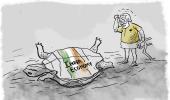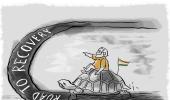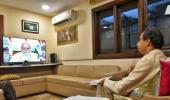'In a serious fiscal situation like this, an ostrich-like focus on annual budgeting, event management and defensive rhetoric will only make matters worse,' warns Rathin Roy.

This is the last column I will be writing as director of the National Institute of Public Finance and Policy. I will focus on the gravity of India's fiscal situation, which I have been pointing out since 2016.
The fragility of central government finances is partly legacy, part refusal to acknowledge and address the problem due to the lack of strategic vision and poor institutional capability.
Government's fiscal space is unintentionally shrinking
In 1950-1951, total expenditure of the Union government was just 4.8 per cent of gross domestic product. As the government took on more and more spending responsibility, this rose to 18 per cent in 1990-1991.
Since then the ratio has been falling almost continuously and was 13.9 per cent in 2013-2014. During the term of this government, the ratio has further fallen to 12.2 per cent in 2019-2020.
This has not happened by design.
Economic liberalisation had only dismantled the licence permit Raj and relaxed import controls. There have, over the past 30 years, been no announcements that the central government was withdrawing from any area of the economy.
On the contrary, flagship programmes and central schemes have expanded the footprint of the central government.
Fiscal space has shrunk because the central government has consistently failed to raise its revenue-GDP ratio. This was 9.37 per cent in 1990-1991. It is 8.18 per cent now.
The tax-GDP ratio peaked at 8.8 per cent in 2007-2008. It is now 7.82 per cent. The attempt to bolster this by disinvestment receipts has not worked, with government making tall claims year after year which are belied.
In recent times, the situation has become so bad that the government has resorted to intra-public sector transactions to boost disinvestment receipts, dividends from the Reserve Bank of India have become a major source of revenue receipts, states have been cheated of their legitimate revenue shares by a resort to cesses, and off-budget transactions have soared.
Ad hoc measures to make ends meet
To maintain some fiscal control, this has meant that the central government in a typical year spends less than what it planned in the budget. Clearly, it cannot cut committed expenditures like interest on debt, wages and salaries.
It cuts operational expenditures and capital expenditures. As a consequence, committed expenditures now account for 35 per cent of total expenditure.
Since revenue receipts are so poor, the government has been consistently borrowing to finance its current (revenue) expenditure.
4.5 per cent of total borrowing was used to finance current expenditure in 1980-1981, rising to 69 per cent in recent years.
Hence, its claims to be spending to boost capital expenditure have been rhetoric, not reality, for over 10 years, resulting in off-budget experimentations, which have poor results and saddle the financial system with non-performing assets.
Neglect of this dire fiscal situation, and an exclusive (but ultimately unsuccessful) focus on containing the fiscal deficit has meant that the government has not come clean about its inability to deliver on its expenditure commitments.
The Budget speeches are full of extravagant rhetoric regarding public spending while in practice, it shrinks every year.
The quality of limited spending scattered over too many areas is bound to worsen, as it has, forcing the government to abandon, except in rhetoric, any development mandate and focus purely on compensatory direct transfers.
Fiscal credibility has diminished to a point where grandiose announcements are forgotten as soon as they are made, and the entire focus is on somehow making ends meet.
Fiscal situation is a hallmark of a weak central government
The solution is obvious: Acknowledge the problem and develop a medium-term strategic framework to address it.
Unfortunately, this requires a degree of institutional cohesion that is currently absent.
The ministry of finance is organised as an administrative ministry, focused on annual budgeting and encumbered, over time, with hastily created departments like the department of investment and public asset management and department of financial services.
It lacks the bandwidth and the institutional competence to move to a medium-term fiscal framework.
Unlike home, defence and external affairs, finance has no single executive head -- the finance secretary is just the senior most secretary, and has no authority to execute coordinated action.
Policy-making, implementation and administration are not clearly demarcated activities. This has led to a focus on theatrics typical of a weak government.
'Austerity measures' are announced and soon forgotten.
There is no accountability for continued failure to collect revenues, nor a consistent policy to reverse this trend.
Rather than fiscal-monetary coordination, the RBI dividend becomes the focus of discussion.
I have repeatedly outlined, in my columns, and through government channels, the strategic and detailed steps that need to be taken for the government to regain control over its fiscal policy.
My pleas have been ignored, but I must reiterate them one final time and hope they will not be treated like the proverbial messenger bearing bad news.
In a serious fiscal situation like this, an ostrich-like focus on annual budgeting, event management and defensive rhetoric will only make matters worse.
A medium-term fiscal framework with realistic revenue projections, binding expenditure targets, and clearly defined objectives for structural change is urgently required.
Fiscal helplessness and floundering in the response to the Covid crisis should have held a mirror to this.
Institutional reforms, including a fiscal council, and a fit for purpose finance ministry architecture, can no longer be postponed.
I hope the political energy to lead, complete, and finish this important task will be forthcoming.
It is not too late, but it soon will be.












 © 2025
© 2025